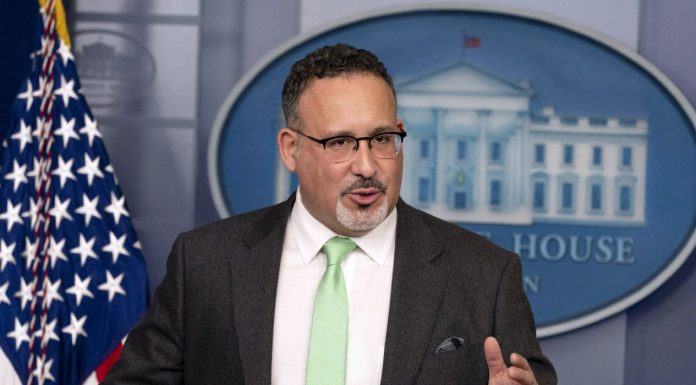(The Center Square) – Republican lawmakers are questioning the Biden administration about cancel culture on college campuses and asking the question: why are federal taxpayer dollars funding it?
House Committee on Oversight and Reform Ranking Member Rep. James Comer, R-Ky., and House Committee on Education and Labor Ranking Member Virginia Foxx, R-N.C., sent a letter Wednesday to Education Secretary Miguel Cardona pointing to several instances of certain viewpoints being silenced and to find out “what actions, if any, the Department is taking to promote free speech and academic freedom on college campuses.
“We are conducting oversight over the U.S. Department of Education’s (the Department) administration of taxpayers’ dollars awarded to public and private colleges and universities under various federal programs,” the letter said. “Specifically, we are concerned many of these colleges and universities are undermining free speech and academic freedom on their campuses. Despite this problem, the Department does not seem to be engaged in promoting the free exchange of ideas within our colleges and universities.”
The push for accountability comes after a string of high profile speakers being pushed off campus as well as students facing consequences for unpopular opinions.
“Administrators at Yale Law School threatened to interfere with one student’s ability to pass the character and fitness examination for his bar license unless he apologized to a student group for an email,” the letter said. “St. Louis University disbursed student fees among student organizations discriminately, based on political or ideological affiliation. Certain faculty at University of Pennsylvania, Georgetown University Law Center, and Princeton University have been placed on administrative leave or faced threats of termination or indefinite ‘investigations’ for expressing their opinions outside the classroom on social media.”
The committee pointed out that in 2019 alone, major universities received billions of dollars in federal funds.
Georgetown University received roughly $370 million, Harvard University $1.1 billion, the University of Pennsylvania $830 million, the University of Southern California $1.1 billion and Yale University $620 million.
“In total for 2019, federal funds were remitted to public and private postsecondary education institutions in the form of federal student aid ($98 billion), grants ($41 billion), and contracts ($10 billion),” the letter said. “Additionally, since 2020, Congress pumped $76.2 billion in ’emergency’ funds into the Higher Education Emergency Relief Fund (HEERF) via the Coronavirus Aid, Relief, and Economic Security Act (CARES Act), the Coronavirus Response and Relief Supplemental Appropriations Act (CRRSAA), and the American Rescue Plan Act (ARPA).”
The same pattern has played out at private institutions as well.
“At University of Washington, a computer science professor was disciplined for refusing to include a controversial ‘indigenous land acknowledgement’ statement on his course syllabi,” the letter said. “In another case, it took a federal lawsuit for University of Michigan to disband its ‘bias response team’ which was dampening free speech by seeking out and reporting student conduct that was considered ‘hostile’ or ‘biased’ against certain groups. This past spring, disruptive student protesters shut down a speech by constitutional law scholar Ilya Shapiro at University of California, Hastings College of the Law.
“In fact, student protesters routinely try to disrupt and even shut down campus speakers. U.S. Senator Kyrsten Sinema, an instructor at Arizona State University, was harassed even in the bathroom by protestors who were upset with her voting record,” the letter said.
Lawmakers pointed out the Department of Education did not extend Trump administration’s free speech hotline for reporting violations.
The letter argues this level of government funding should come with accountability.
“For this reason, these institutions of higher learning should be havens of free speech. Instead, school administrators are undermining the very purpose of their institutions,” letter said. “The proliferation of cancel culture in American higher education threatens the ability of students and faculty to push themselves past their academic limits. The Department should be signaling to these institutions that academic freedom is paramount for the success of students, faculty, and society, and should help them see that limiting free speech is counter to the intellectual goals of academia.”
The Department of Education did not respond to a request for comment in time for publication.

